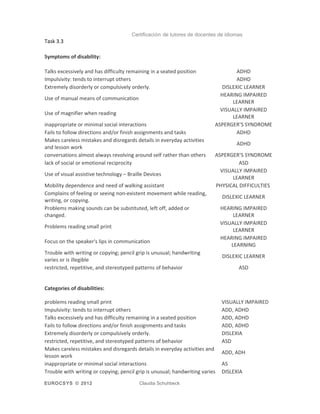
Task 3.3
- 1. Certificación de tutores de docentes de idiomas Task 3.3 Symptoms of disability: Talks excessively and has difficulty remaining in a seated position ADHD Impulsivity: tends to interrupt others ADHD Extremely disorderly or compulsively orderly. DISLEXIC LEARNER HEARING IMPAIRED Use of manual means of communication LEARNER VISUALLY IMPAIRED Use of magnifier when reading LEARNER inappropriate or minimal social interactions ASPERGER’S SYNDROME Fails to follow directions and/or finish assignments and tasks ADHD Makes careless mistakes and disregards details in everyday activities ADHD and lesson work conversations almost always revolving around self rather than others ASPERGER’S SYNDROME lack of social or emotional reciprocity ASD VISUALLY IMPAIRED Use of visual assistive technology – Braille Devices LEARNER Mobility dependence and need of walking assistant PHYSICAL DIFFICULTIES Complains of feeling or seeing non-existent movement while reading, DISLEXIC LEARNER writing, or copying. Problems making sounds can be substituted, left off, added or HEARING IMPAIRED changed. LEARNER VISUALLY IMPAIRED Problems reading small print LEARNER HEARING IMPAIRED Focus on the speaker's lips in communication LEARNING Trouble with writing or copying; pencil grip is unusual; handwriting DISLEXIC LEARNER varies or is illegible restricted, repetitive, and stereotyped patterns of behavior ASD Categories of disabilities: problems reading small print VISUALLY IMPAIRED Impulsivity: tends to interrupt others ADD, ADHD Talks excessively and has difficulty remaining in a seated position ADD, ADHD Fails to follow directions and/or finish assignments and tasks ADD, ADHD Extremely disorderly or compulsively orderly. DISLEXIA restricted, repetitive, and stereotyped patterns of behavior ASD Makes careless mistakes and disregards details in everyday activities and ADD, ADH lesson work inappropriate or minimal social interactions AS Trouble with writing or copying; pencil grip is unusual; handwriting varies DISLEXIA EUROCSYS © 2012 Claudia Schuhbeck
- 2. Certificación de tutores de docentes de idiomas or is illegible PHYSICAL Mobility dependence and need of walking assistant DIFFICULTIES HEARING Use of manual means of communication IMPAIREMENT HEARING Voice problems, speak too loudly or not loud enough IMPAIRMENT VISUALLY Use of visual assistive technology – Braille Devices IMPAIRMENT conversations almost always revolving around self rather than others AS HEARING focus on the speaker’s lips in communication IMPAIRMENT Complains of feeling or seeing non-existent movement while reading, DISLEXIA writing, or copying. Problems making sounds. Sounds can be substituted, left off, added or HEARING changed. IMPAIRMENT lack of social or emotional reciprocity ASD EUROCSYS © 2012 Claudia Schuhbeck